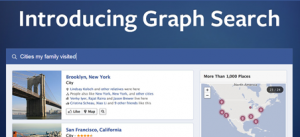
Graph search beta was unveiled on January 15, 2013 for Facebook users. This feature is designed to help all the billion-plus Facebook users search for people and places within the social network. The ‘Graph Search’ will allow users to sort through content that has been shared with them.
Guided by Facebook’s mission which is making the world more open and connected, the graph search feature hopes that people will map out their relationships with people and things they care about. Facebook calls it mapping the graph. The feature’s task is big as Facebook is constantly expanding with new people, connections and contents. With its more than a billion people, more than 240 million photos and more than a trillion connections, the task is gargantuan.
With ‘Graph Search’, Facebook users will have a new way of navigating these connections to make them more useful. This newest feature will appear as a bigger search bar at the top of each page. When a search is made, such search will determine the results you get plus the search query becomes the title of the page. The title can be edited which will actually allow a unique custom view of the contents shared by friends on Facebook.
Different from web search, an example of a search query in Graph Search will be something like “my friends who love surfing”. Combined phrases, not keywords will define your search criteria in order to get results showing a set of people, places, photos or other content, relevant to the query, that’s been shared on Facebook.
And unlike web search, Graph Search is built from the start with privacy in mind. Every piece of content on Facebook has its own defined audience and most of the content is not available for public viewing. Graph Search respects that privacy and audience. It makes finding new things much easier without disrupting privacy.

The first version of Graph Search tackles four main areas – people, photos, places, and interests.
- People. Facebook users can search for “friends who live in my city,” “people from my city who like hiking,” “friends of friends who attended the New Year countdown in NY,” “software programmers who graduated from MIT,” “people who like things I like,” “people who play tennis and live nearby.” You can add any specific criteria to the search query that will make you find people within your social network.
- Photos. Facebook users can search for “photos I like,” “photos of my family,” “photos of my friends in High School,” “photos of my friends taken in DC,” “photos of the Eiffel Tower”, etc.
- Places. Search queries may run like, “restaurants in San Francisco,” “countries visited by my family,” “Italian restaurants in the US liked by my friends from Italy,” “tourist destinations in Asia visited by friends,” “Malls in New York liked by my friends,” or “countries my friends have visited.”
- Interests. This will search for “music like by my friends,” “movies I watched and other people watched,” “languages my friends speak,” “video games played by friends online,” “books read by CEOs,” etc.
According to Facebook CEO, Mark Zuckerberg, “Graph Search is a really big product. It’s going to take years and years to index the whole map of the graph and everything we have out there.” The CEO is hopeful that more people will get their hands on Graph Search in the coming weeks and months.
Facebook has made another milestone in making search for information and interest easier for its user. A different user experience is defined by this graph search for a user will not be redirected to another website when it clicks on a certain result. This is yet another first for search. If users will embrace this change, then search is heading on another direction in which Facebook becomes the benchmark of the new way of search.
With these in mind, a lot of questions came out. Questions like “how is this graph search going to send social signals to known search engines and help website rank?,” “will the old optimization techniques in Facebook still work for search engines?,” “if people embraces this new kind of search, how is it going to affect searches in search engines?,” etc.



